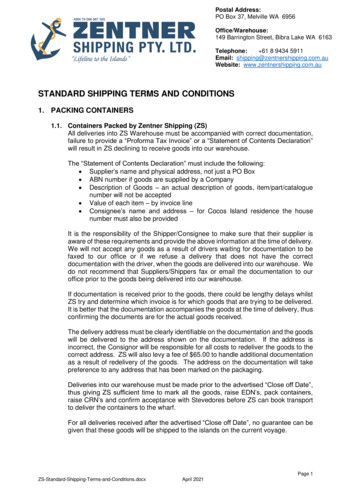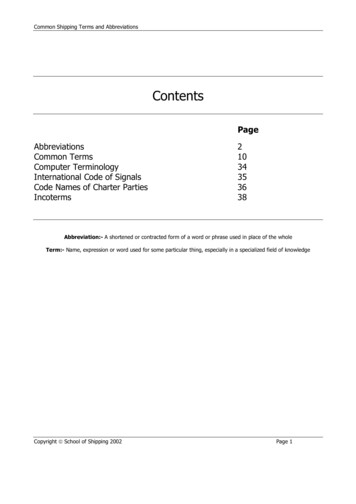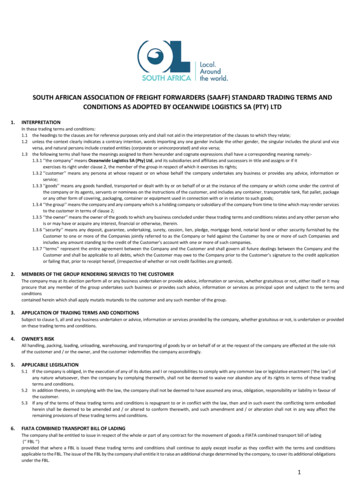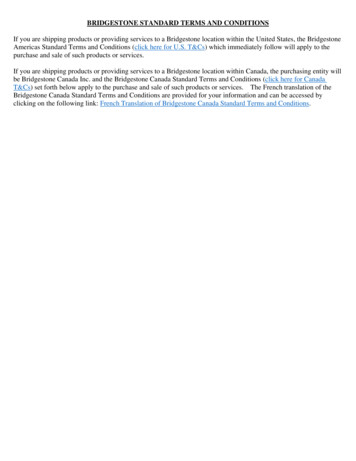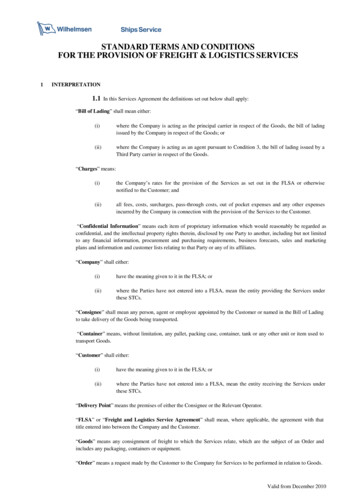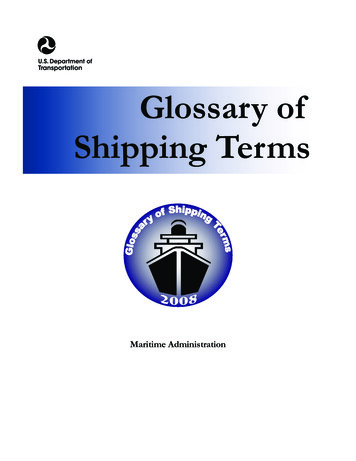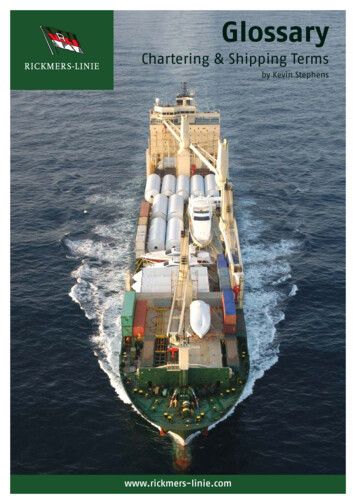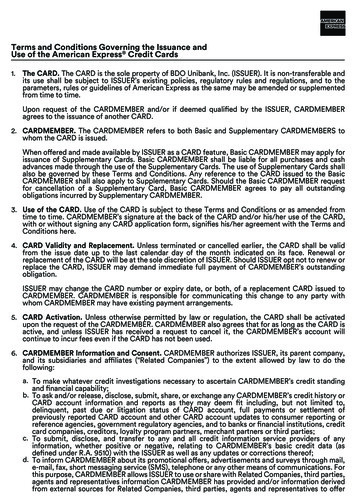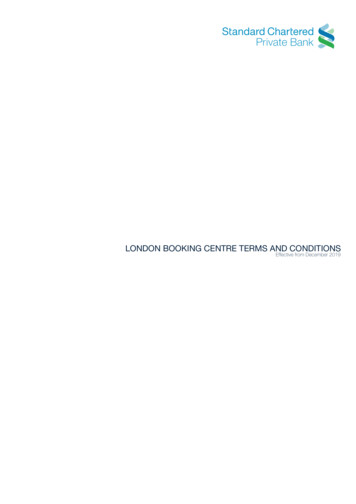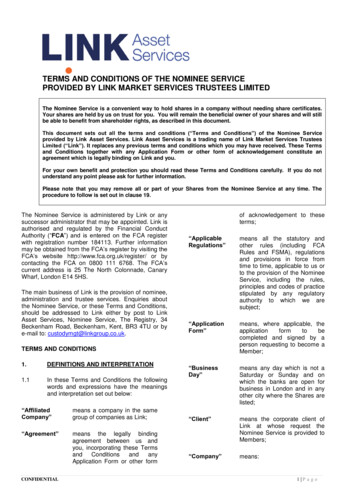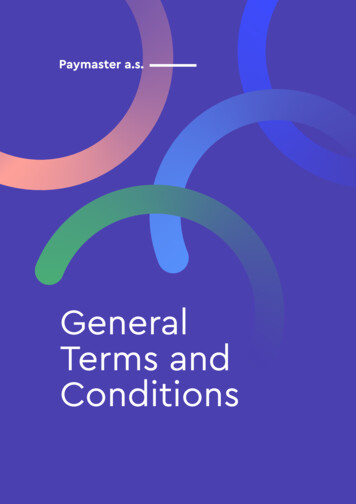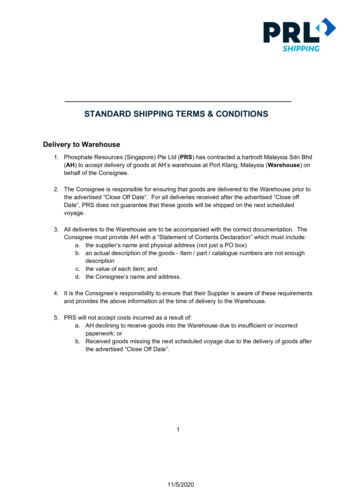
Transcription
STANDARD SHIPPING TERMS & CONDITIONSDelivery to Warehouse1. Phosphate Resources (Singapore) Pte Ltd (PRS) has contracted a.hartrodt Malaysia Sdn Bhd(AH) to accept delivery of goods at AH’s warehouse at Port Klang, Malaysia (Warehouse) onbehalf of the Consignee.2. The Consignee is responsible for ensuring that goods are delivered to the Warehouse prior tothe advertised “Close Off Date”. For all deliveries received after the advertised “Close offDate”, PRS does not guarantee that these goods will be shipped on the next scheduledvoyage.3. All deliveries to the Warehouse are to be accompanied with the correct documentation. TheConsignee must provide AH with a “Statement of Contents Declaration” which must include:a. the supplier’s name and physical address (not just a PO box)b. an actual description of the goods - Item / part / catalogue numbers are not enoughdescriptionc. the value of each item; andd. the Consignee’s name and address.4. It is the Consignee’s responsibility to ensure that their Supplier is aware of these requirementsand provides the above information at the time of delivery to the Warehouse.5. PRS will not accept costs incurred as a result of:a. AH declining to receive goods into the Warehouse due to insufficient or incorrectpaperwork; orb. Received goods missing the next scheduled voyage due to the delivery of goods afterthe advertised “Close Off Date”.111/5/2020
Packing of Containers6. The Consignee must ensure that all goods delivered to the Warehouse are packaged insuitable boxes or cartons in a manner suitable for loading into a container for sea freight.7. PRS and/or AH reserve the right to refuse to accept any goods that are not wrapped and/orpacked correctly for shipment. Acceptance of goods does not imply that the goods areproperly packed.8. AH will consolidate freight and arrange for packing into containers provided by PRS.9. If the Consignee arranges for containers to be packed by an entity other than AH, theConsignee is responsible for providing the information set out in clause 3 above to AH forprovision to PRS.10. The maximum Gross Weight of containers for Christmas island cannot exceed 24 MT.Sea Carriage11. PRS will endeavour to ship all goods as soon as possible. Usually, goods received andaccepted at the Warehouse before the “Close off Date” will be shipped on board the nextscheduled voyage as per the Sailing Schedule. Sailing Schedule means the scheduleddeparture of the vessel from Port Klang and the anticipated arrival date at port in ChristmasIsland. Whilst any changes to the Sailing Schedule are regrettable, PRS will not be heldresponsible for any costs that changes may cause.12. PRS will not be liable for any costs, charges, expenses, loss or damage that the Shipper maysuffer or incur by reason of the goods being unable to be loaded onto the vessel due to lackof space, adverse sea or weather conditions, or any other cause beyond our control or forwhich PRS are directly and solely responsible.13. The terms and conditions for sea carriage will be as set out in the bill of lading which will bemade available for each consignee upon ship’s departure. The terms and conditions of the billof lading are included at the end of this document and form part of the Shipping Terms andConditions.14. All quotations for sea freight are based on current tariffs and are valid for that voyage only.15. FCL – Rates quoted from the Warehouse and allow for containers to be unloaded onto thewharf at Christmas Island and delivered to consignee address on island.16. LCL – Rates quoted from the Warehouse and allow for LCL to be unloaded onto the wharf atChristmas island and delivered to consignee address on island.211/5/2020
17. Break Bulk – The Shipper must supply a General Arrangement drawing detailinglifting/lashing points and Centre of Gravity (COG). Machinery will be carried on or under deckat our discretion. The rate charged is warehouse to wharf at Christmas Island and does notinclude delivery on the Island.18. All machinery for shipping to Christmas Island must be cleaned to Australian Biosecurityrequirements prior to delivery to the ship.19. Dangerous Goods – All dangerous goods (DG) to be shipped, as defined in the IMDG Code,must be reported to PRS prior to delivery to PRS. Goods must be clearly marked and packedto IMDG Standards with all necessary documentation. Nothing in these terms or conditionslimits or restricts any rights under the Hague Rules with respect to DG.20. Delays – If cargo operations/working the ship is delayed by weather conditions or portcongestion at Christmas Island we reserve the right to wait until conditions improve.Stevedoring is undertaken by private stevedoring companies. Whilst stevedoring costs areincluded in our rate, we have no control over priority of handling containers/cargo. As a result,we cannot be held responsible, nor accept any costs as a result of delays in handlingcontainers/cargo.21. Brown Marmorated Stink bug (BMSB) – The Shipper/Charterer must warrant absolutely thatthe goods, including packaging are free from the BMSB and their eggs and that the goodshave been properly treated in accordance with the standards for BMSB treatment of theAustralian Government Department of Agriculture and Water Resources. Prior to loading avalid BMSB Treatment Certificate must be provided by the Shipper/Consignee.22. If no valid BMSB Certificate is submitted, PRS may refuse to load the goods.23. Notwithstanding the provision of a BMSB Treatment Certificate or whether the goods can beclassified a high risk, should an infestation of BMSB be found or suspected, theShipper/Consignee shall be liable for any or all consequences whatsoever, including but notlimited to damages for Detention, costs and third party liabilities including cost of compliancewith any government direction and freight costs of returning contaminated goods to origin. Thegoods may be destroyed, rendered innocuous or landed at any place by us withoutcompensation with liability for costs arising.Delivery in Christmas Island24. Ackers Pty Ltd shall act as cargo distribution at the port in Christmas Island. Ackers shallbe responsible for:a. Receipt of the cargo upon discharge.b. Deconsolidation of the containers; andc. Storage of the cargo until collection or delivery to the Consignee311/5/2020
25. It is the responsibility of the Consignee to ensure that all containers are cleaned, bothinternally and externally to Australian Biosecurity requirements before containers aredelivered to the wharf for backloading.26. Containers owned by PRS are available for use at no extra charge and no charge is made fortheir return to Port Klang.27. Containers owned by any other party will be returned to Port Klang as soon as practical, butno guarantee can be made as to when they will be returned.Insurance & Liability28. PRS is not a common carrier. The Consignee should take out their own insurance to coverloss/damage to their goods from the time goods are delivered to AH to the time the goods aredelivered into Consignee’s or their representative’s possession.29. If goods are lost or damaged during shipment, the Consignee is still responsible to pay for theshipping costs as well as any other associated costs.30. For FCL containers, the Consignee should take out insurance to cover costs that could resultfrom loss/damage to the container.31. It is the responsibility of the Consignee to insure cargo for whatever reason necessary duringthe shipment of goods to/from the island.32. PRS will not compensate the Consignee for any costs they incur as a result of loss/damage totheir goods whilst in the process of shipping to/from Christmas Island.33. Although PRS may arrange for, amongst other thing, the storage, carriage, consolidation andeconsolidation of the cargo from delivery at the Warehouse until delivery to the Consignee inChristmas Island, PRS shall contract as the Consignee’s Agent only and shall not be liable forany loss or damage arising during any part of the carriage other than between the port ofloading and the port of discharge, even though the freight for the whole carriage has beencollected by PRS.Loss and Damage34. Any alleged loss/damage of/to goods during carriage must be reported in writing withphotographs within 10 days of discharge. PRS will investigate all reports received within the10-day period and provide Consignees with a written report.35. Notwithstanding the findings in any written report, PRS does not accept any responsibility orliability for costs associated with loss or damage to the goods.411/5/2020
Payment36. All shipping costs will be invoiced to the Consignee unless otherwise agreed in advance.37. Unless otherwise agreed in advance, we require that all invoices for shipping costs and otherservices provided by us must be paid and cleared into our nominated account before thegoods will be released.38. Failure to make payment may result in additional charges, all costs of holding the cargo will bepassed on to the customer and include detention charges after 3 days.Next page for Conline2000 Bill of Lading Conditions511/5/2020
BIMCO LINER BILL OF LADINGPage 2Code Name: “CONLINEBILL 2000”1. Definition."Merchant" includes the shipper, the receiver, the consignor, theconsignee, the holder of the Bill of Lading, the owner of the cargoand any person entitled to possession of the cargo.2. Notification.Any mention in this Bill of Lading of parties to be notified of thearrival of the cargo is solely for the information of the Carrier andfailure to give such notification shall not involve the Carrier in anyliability nor relieve the Merchant of any obligation hereunder.3. Liability for Carriage Between Port of Loading and Port ofDischarge.(a) The International Convention for the Unification of Certain Rulesof Law relating to Bills of Lading signed at Brussels on 25 August1924 ("the Hague Rules") as amended by the Protocol signed atBrussels on 23 February 1968 ("the Hague-Visby Rules") and asenacted in the country of shipment shall apply to this Contract.When the Hague-Visby Rules are not enacted in the country ofshipment, the corresponding legislation of the country of destinationshall apply, irrespective of whether such legislation may onlyregulate outbound shipments.When there is no enactment of the Hague-Visby Rules in either thecountry of shipment or in the country of destination, the HagueVisby Rules shall apply to this Contract save where the HagueRules as enacted in the country of shipment or, if no suchenactment is in place, the Hague Rules as enacted in the country ofdestination apply compulsorily to this Contract.The Protocol signed at Brussels on 21 December 1979 ("the SDRProtocol 1979") shall apply where the Hague-Visby Rules apply,whether mandatorily or by this Contract.The Carrier shall in no case be responsible for loss of or damage tocargo arising prior to loading, after discharging, or with respect todeck cargo and live animals.(b) If the Carrier is held liable in respect of delay, consequential lossor damage other than loss of or damage to the cargo, the liability ofthe Carrier shall be limited to the freight for the carriage covered bythis Bill of Lading, or to the limitation amount as determined in subclause 3(a), whichever is the lesser.(c) The aggregate liability of the Carrier and/or any of his servants,agents or independent contractors under this Contract shall, in nocircumstances, exceed the limits of liability for the total loss of thecargo under sub-clause 3(a) or, if applicable, the Additional Clause.4. Law and Jurisdiction.cargo the Carrier’s discharging of the cargo shall be deemedfulfilment of the contract of carriage. Should the cargo not beapplied for within a reasonable time, the Carrier may sell the sameprivately or by auction. If the Merchant or his Agent fails to takedelivery of the cargo as fast as the Vessel can discharge, theMerchant shall be liable to the Carrier for any overtime charges,losses, costs and expenses incurred by the Carrier.(f) The Merchant shall accept his reasonable proportion ofunidentified loose cargo.10. Freight, Charges, Costs, Expenses, Duties, Taxes andFines.(a) Freight, whether paid or not, shall be considered as fully earnedupon loading and non-returnable in any event. Unless otherwisespecified, freight and/or charges under this Contract are payable bythe Merchant to the Carrier on demand. Interest at Libor (or itssuccessor) plus 2 per cent. shall run from fourteen days after thedate when freight and charges are payable.(b) The Merchant shall be liable for all costs and expenses offumigation, gathering and sorting loose cargo and weighingonboard, repairing damage to and replacing packing due toexcepted causes, and any extra handling of the cargo for any of theaforementioned reasons.(c) The Merchant shall be liable for any dues, duties, taxes andcharges which under any denomination may be levied, inter alia, onthe basis of freight, weight of cargo or tonnage of the Vessel.(d) The Merchant shall be liable for all fines, penalties, costs,expenses and losses which the Carrier, Vessel or cargo may incurthrough non-observance of Customs House and/or import or exportregulations.(e) The Carrier is entitled in case of incorrect declaration ofcontents, weights, measurements or value of the cargo to claimdouble the amount of freight which would have been due if suchdeclaration had been correctly given. For the purpose ofascertaining the actual facts, the Carrier shall have the right toobtain from the Merchant the original invoice and to have the cargoinspected and its contents, weight, measurement or value verified.11. Lien.The Carrier shall have a lien on all cargo for any amount due underthis contract and the costs of recovering the same and shall beentitled to sell the cargo privately or by auction to satisfy any suchclaims.12. General Average and Salvage.Master may discharge the cargo at the Port of loading or any othersafe and convenient port.(d) The discharge, under the provisions of this Clause, of any cargoshall be deemed due fulfilment of the contract of carriage.(e) If in connection with the exercise of any liberty under this Clauseany extra expenses are incurred they shall be paid by the Merchantin addition to the freight, together with return freight, if any, and areasonable compensation for any extra services rendered to thecargo.15. Defences and Limits of Liability for the Carrier, Servantsand Agents.(a) It is hereby expressly agreed that no servant or agent of theCarrier (which for the purpose of this Clause includes everyindependent contractor from time to time employed by the Carrier)shall in any circumstances whatsoever be under any liabilitywhatsoever to the Merchant under this contract of carriage, for anyloss, damage or delay of whatsoever kind arising or resultingdirectly or indirectly from any act, neglect or default on his part whileacting in the course of or in connection with his employment.(b) Without prejudice to the generality of the foregoing provisions inthis Clause, every exemption from liability, limitation, condition andliberty herein contained and every right, defence and immunity ofwhatsoever nature applicable to the Carrier or to which the Carrieris entitled, shall also be available and shall extend to protect everysuch servant and agent of the Carrier acting as aforesaid.(c) The Merchant undertakes that no claim shall be made againstany servant or agent of the Carrier and, if any claim shouldnevertheless be made, to indemnify the Carrier against allconsequences thereof.(d) For the purpose of all the foregoing provisions of this Clause theCarrier is or shall be deemed to be acting as agent or trustee onbehalf of and for the benefit of all persons who might be his servantsor agents from time to time and all such persons shall to this extentbe or be deemed to be parties to this Contract of carriage.16. Stowage.(a) The Carrier shall have the right to stow cargo by means ofcontainers, trailers, transportable tanks, flats, pallets, or similararticles of transport used to consolidate goods.(b) The Carrier shall have the right to carry containers, trailers,transportable tanks and covered flats, whether stowed by the Carrieror received by him in a stowed condition from the Merchant, on orunder deck without notice to the Merchant.Disputes arising out of or in connection with this Bill of Lading shallbe exclusively determined by the courts and in accordance with thelaw of the place where the Carrier has his principal place ofbusiness, as stated on Page 1, except as provided elsewhereherein.5. The Scope of Carriage.The intended carriage shall not be limited to the direct route butshall be deemed to include any proceeding or returning to orstopping or slowing down at or off any ports or places for anyreasonable purpose connected with the carriage includingbunkering, loading, discharging, or other cargo operations andmaintenance of Vessel and crew.6. Substitution of Vessel.The Carrier shall be at liberty to carry the cargo or part thereof tothe Port of discharge by the said or other vessel or vessels eitherbelonging to the Carrier or others, or by other means of transport,proceeding either directly or indirectly to such port.7. Transhipment.The Carrier shall be at liberty to tranship, lighter, land and store thecargo either on shore or afloat and reship and forward the same tothe Port of discharge.8. Liability for Pre- and On-Carriage.When the Carrier arranges pre-carriage of the cargo from a placeother than the Vessel's Port of loading or on-carriage of the cargo toa place other than the Vessel's Port of discharge, the Carrier shallcontract as the Merchant's Agent only and the Carrier shall not beliable for any loss or damage arising during any part of the carriageother than between the Port of loading and the Port of dischargeeven though the freight for the whole carriage has been collected byhim.9. Loading and Discharging.(a) Loading and discharging of the cargo shall be arranged by theCarrier or his Agent.(b) The Merchant shall, at his risk and expense, handle and/or storethe cargo before loading and after discharging.(c) Loading and discharging may commence without prior notice.(d) The Merchant or his Agent shall tender the cargo when theVessel is ready to load and as fast as the Vessel can receiveincluding, if required by the Carrier, outside ordinary working hoursnotwithstanding any custom of the port. If the Merchant or his Agentfails to tender the cargo when the Vessel is ready to load or fails toload as fast as the Vessel can receive the cargo, the Carrier shallbe relieved of any obligation to load such cargo, the Vessel shall beentitled to leave the port without further notice and the Merchantshall be liable to the Carrier for deadfreight and/or any overtimecharges, losses, costs and expenses incurred by the Carrier.(e) The Merchant or his Agent shall take delivery of the cargo asfast as the Vessel can discharge including, if required by theCarrier, outside ordinary working hours notwithstanding any customof the port. If the Merchant or his Agent fails to take delivery of theGeneral Average shall be adjusted, stated and settled in Londonaccording to the York-Antwerp Rules 1994, or any modificationthereof, in respect of all cargo, whether carried on or under deck. Inthe event of accident, danger, damage or disaster before or aftercommencement of the voyage resulting from any cause whatsoever,whether due to negligence or not, for which or for the consequenceof which the Carrier is not responsible by statute, contract orotherwise, the Merchant shall contribute with the Carrier in GeneralAverage to the payment of any sacrifice, losses or expenses of aGeneral Average nature that may be made or incurred, and shallpay salvage and special charges incurred in respect of the cargo. Ifa salving vessel is owned or operated by the Carrier, salvage shallbe paid for as fully as if the salving vessel or vessels belonged t
STANDARD SHIPPING TERMS & CONDITIONS Delivery to Warehouse . 1. Phosphate Resources (Singapore) Pte Ltd (PRS) has contracted a.hartrodt Malaysia Sdn Bhd (AH) to accept delivery of goods at AH’s warehouse at Port Klang, Malaysia (Warehouse) on behalf of the Consignee. 2. The Consignee is res
